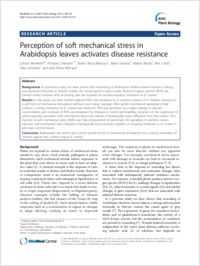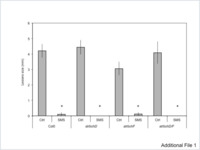Perception of soft mechanical stress in Arabidopsis leaves activates disease resistance
- Benikhlef, Lehcen Department of Biology, University of Fribourg, Switzerland
- L'Haridon, Floriane Department of Biology, University of Fribourg, Switzerland
- Abou-Mansour, Eliane Department of Biology, University of Fribourg, Switzerland
- Serrano, Mario Department of Biology, University of Fribourg, Switzerland
- Binda, Matteo Department of Biology, University of Fribourg, Switzerland
- Costa, Alex Department of Biosciences, University of Milan, Italy
- Lehmann, Silke Department of Biology, University of Fribourg, Switzerland
- Métraux, Jean-Pierre Department of Biology, University of Fribourg, Switzerland
-
13.09.2013
Published in:
- BMC Plant Biology. - 2013, vol. 13, no. 1, p. 133
English
Background: in a previous study we have shown that wounding of Arabidopsis thaliana leaves induces a strong and transient immunity to Botrytis cinerea, the causal agent of grey mould. Reactive oxygen species (ROS) are formed within minutes after wounding and are required for wound–induced resistance to B. cinerea.Results: in this study, we have further explored ROS and resistance to B. cinerea in leaves of A. thaliana exposed to a soft form of mechanical stimulation without overt tissue damage. After gentle mechanical sweeping of leaf surfaces, a strong resistance to B. cinerea was observed. This was preceded by a rapid change in calcium concentration and a release of ROS, accompanied by changes in cuticle permeability, induction of the expression of genes typically associated with mechanical stress and release of biologically active diffusates from the surface. This reaction to soft mechanical stress (SMS) was fully independent of jasmonate (JA signaling). In addition, leaves exposed soft mechanical stress released a biologically active product capable of inducing resistance to B. cinerea in wild type control leaves.Conclusion: Arabidopsis can detect and convert gentle forms of mechanical stimulation into a strong activation of defense against the virulent fungus B. cinerea.
- Faculty
- Faculté des sciences et de médecine
- Department
- Département de Biologie
- Language
-
- English
- Classification
- Biological sciences
- License
- License undefined
- Identifiers
-
- RERO DOC 203192
- DOI 10.1186/1471-2229-13-133
- Persistent URL
- https://folia.unifr.ch/unifr/documents/303237
Other files
Statistics
Document views: 73
File downloads:
- lar_psm.pdf: 141
- lar_psm_sm.pdf: 72

